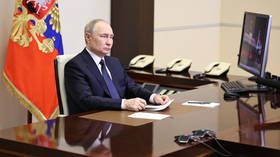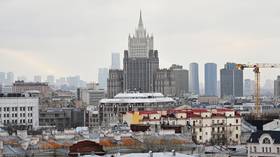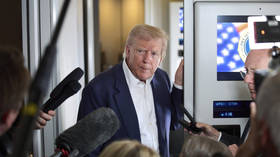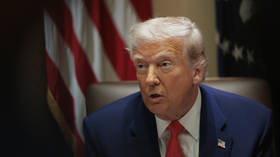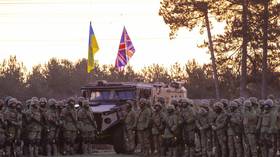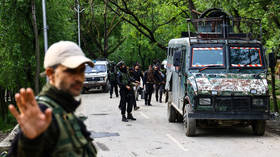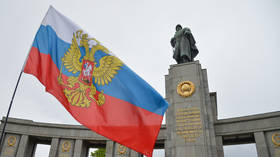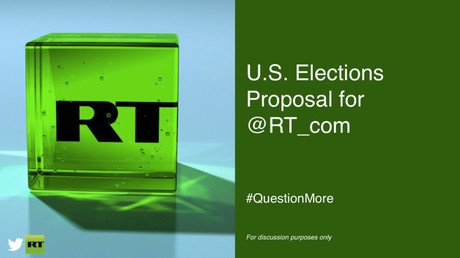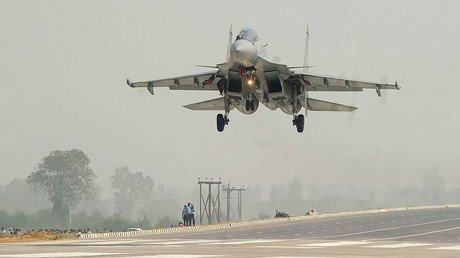Guardians of the truth? Some of TIME’s ‘Person(s) of the Year’ choices are perplexing
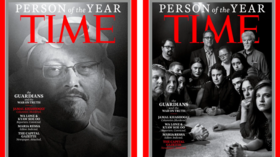
TIME magazine has chosen a group of journalists it refers to as ‘The Guardians’ as its 2018 most influential ‘Person of the Year’ – but some of the journalists the magazine included for honors have raised a few eyebrows.
The decision to pick journalists for the annual title was perhaps not so surprising in the era of Donald Trump, who is constantly at odds with the media at large, labeling any report he isn’t fond of as “fake news” – but there is a niggling sense that TIME’s decision to put the spotlight on the media as the Guardians of truth is not entirely sincere.
TIME explains its reasoning under the headline “The Guardians and the War on Truth” and, while it would be difficult to quibble over including murdered Saudi journalist Jamal Khashoggi – or Reuters reporters Wa Lone and Kyaw Soe Oo, who were arrested covering the plight of Rohingya Muslims in Myanmar, some of the other choices are more surprising.
Take Ukrainian journalist Arkady Babchenko. For many in the West, the first they had heard of Babchenko was the news of his untimely death at the hands of alleged Russian state assassins; It turned out to be one of the biggest fake news stories of the last year, orchestrated by none other than Babchenko himself, along with Ukraine’s security service (SBU). While Time seems to applaud Babchenko’s fakery, which, they note, turned him into a “pariah” among some of his Ukrainian colleagues who felt their own credibility was damaged after the stunt.
Babchenko is a strange choice indeed for a list purporting to honor the guardians of truth. In his post on Facebook Babchenko even thanked SBU, using their joking nickname, and said that this award is theirs as well.
Hmm. Interesting move by @TIME to include Arkady Babchenko in #TIMEPOY as it relates to "war on truth." Recall he's the journalist who faked his death in Ukraine with help from the country's controversial security service, which hasn't been completely truthful about the operation pic.twitter.com/eAqcvlfIoz
— Christopher Miller (@ChristopherJM) December 11, 2018
Also, Babchenko hasn't done any actual journalism in... how many years? Hate-filled Facebook diatribes and collaborating with a successor agency to KGB to fool hundreds of well-meaning colleagues don't count. See thread for context often missing from "heroic reporter" narrative. https://t.co/ip0vsZwuWo
— Alexey Kovalev (@Alexey__Kovalev) December 11, 2018
It is also interesting to note who did not make TIME’s list of truth-guarding journalists. In particular, WikiLeaks whistleblower Julian Assange, who has languished, as though a political prisoner, for more than six years in London’s Ecuadorean embassy.
Assange was given refuge at the embassy under threat of extradition to the US, where the Justice Department has brought criminal charges against him for releasing highly sensitive government secrets through WikiLeaks. Assange also faced dubious sexual assault allegations in Sweden, which were dropped after a preliminary investigation last year.
In 2016, a United Nations Working Group denounced Assange’s “arbitrary detention” and called on British and Swedish authorities to end his "deprivation of liberty, respect his physical integrity and freedom of movement, and afford him the right to compensation.”
But nowhere in TIME’s lengthy article about the freedom of the press and the war on truth is Assange’s name mentioned, despite the fact that no government or individual has ever managed to challenge the authenticity of any of WikiLeaks’ document releases. Maybe the fact that WikiLeaks released information which hurt Hillary Clinton’s campaign for president in 2016 precludes him from the honor. After all, Clinton was a firm favorite among the US media and journalists roundly blamed WikiLeaks for damaging her campaign, even implying that WikiLeaks was working with Russia to help elect Trump.
IDK about you but when I think of "guardians" in this context I think of Julian Assange of @wikileaks Serena Shim who is remembered by her mother @judithpoe and people like Michael Hastings. I'm I wrong? and who did I miss? https://t.co/DVWidcMtPM
— Luke Rudkowski (@Lukewearechange) December 11, 2018
The word "Assange" does not appear in "Time's Person of the Year" -- "The Guardians and the War on Truth" -- https://t.co/crbTWZUMBz
— Sam Husseini (@samhusseini) December 11, 2018
Perhaps the strangest thing about TIME’s choice this year is that the annual naming of ‘Person of the Year’ seems to have changed its meaning entirely. In the past, the title has been bestowed on persons whom the editorial board felt had the most impact or influence on world events that year, hence Adolf Hitler was chosen in 1938 and Donald Trump was chosen in 2016, regardless of their moral standings.
This year, however, the title seems to have been turned into a high honor.
They’ve turned it into an honor. It used to be a news judgment.
— NiceMazing (@NiceMazing) December 11, 2018
Subscribe to RT newsletter to get stories the mainstream media won’t tell you.



